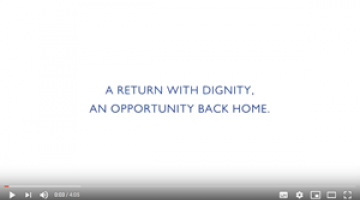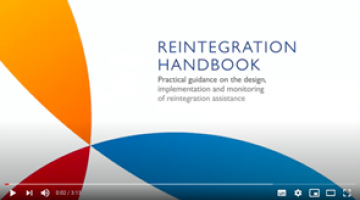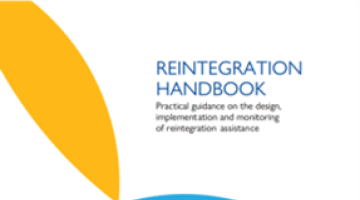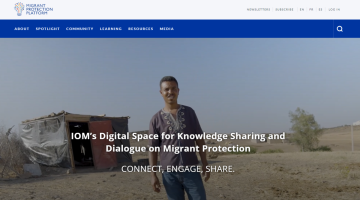Library
- Projects -
The KNOMAD-ILO Migration and Recruitment Costs Surveys aim to systematically document monetary and non-monetary costs incurred by migrant workers seeking jobs abroad. The project is a joint initiative by the Global Knowledge Partnership on Migration and Development (KNOMAD), which is hosted at the...
SourceKNOMAD, International Labour Organization (ILO)
- Resource - Report
This resource presents policymakers and regulators with practical guidance and ideas to improve regulation and oversight of international recruitment and protection of migrant workers. It covers a broad range of themes, including the following: (a) recruitment fees; (b) licensing and registration of...
SourceInternational Organization for Migration (IOM)
- Resource - Working Paper
This paper introduces the idea of a “core rights” approach for global governance of international labour migration. In the context of low ratification numbers of international conventions, Ruhs proposes a debate around what a shorter list of core rights may look like.
SourceInternational Organization for Migration (IOM)
- Resource - Other
The Convention concerning Decent Work for Domestic Workers was adopted during the 100th session of the International Labour Organization in 2011 and entered into force in 2013. It sets labour standards for domestic workers and makes special mention to women and girls, as well as migrants and members...
SourceInternational Labour Organization (ILO)
- Resource - Platform / Website
IRIS is a global initiative from IOM that is designed to promote ethical international recruitment. The IRIS Standard sets a benchmark for ethical recruitment and there is a voluntary certification scheme for ethical labour recruiters, as well as a compliance and monitoring mechanism.
SourceInternational Organization for Migration (IOM)
- Resource - Platform / Website
This thematic page from the Migration Data Portal presents the existing data and knowledge about recruitment costs. It introduces international initiatives that are in place to combat the lack of transparency surrounding recruitment costs.
SourceInternational Organization for Migration (IOM) IOM’s Global Migration Data Analysis Centre (GMDAC)
- Resource - Platform / Website
Anti-Slavery International is an international non-governmental organization that works to end slavery throughout the world, with projects in the UK, Europe, and Africa, and Asia, as well as with campaigns that cover the globe. Their work spans victim protection, counter-trafficking efforts...
SourceAnti-Slavery International
- Video -SourceInternational Organization for Migration (IOM)

- Video -
IOM's holistic need-based approach to reintegration responds to economic, social and psychosocial needs of individual returnees as well as the communities to which they return.
SourceInternational Organization for Migration (IOM)
- Resource - Guidelines/Toolkits/Manuals
This Handbook aims to provide practical guidance on the design, implementation and monitoring of reintegration assistance for returnees. While reintegration is a process taking place in different return contexts (for example following spontaneous, forced or assisted voluntary returns, or internal...
SourceInternational Organization for Migration (IOM)
- Resource - Policy Brief
Throughout history, high numbers of persons have left, or have been forced to leave, their countries of origin. In order to protect migrants or refugees against being returned to places in which their fundamental rights are in danger, States have developed the principle of non-refoulement. This...
SourceInternational Committee of the Red Cross (ICRC)
- Resource - Policy Brief
Under international human rights law, the principle of non-refoulement guarantees that no one should be re-turned to a country where they would face torture, cruel, inhuman or degrading treatment or punishment and other irreparable harm. This principle applies to all migrants at all times...
Source
- Resource - Policy Brief
The purpose of this Information Note is to provide a general overview of the principle of non-refoulement and to explain how the principle applies to all migrants. To this end, the Information Note can be used as a tool by those dealing with border management or returns of migrants to avoid the...
SourceInternational Organization for Migration (IOM)
- Resource - Report
The present report is the first submitted to the Human Rights Council by the mandate holder, Felipe González Morales, who assumed his functions on 1 August 2017. In the report, the Special Rapporteur summarizes the activities undertaken since taking up his functions, and includes a thematic study on...
SourceUN General Assembly
- Resource - Platform / Website
This thematic area of the Global Knowledge Partnership on Migration and Development (KNOMAD) led by the World Bank explores the basis of policies to improve return and reintegration outcomes by conducting surveys on reintegration experiences and carrying out workshop and round-tables to discuss...
SourceKNOMAD
- Resource - Platform / Website
There are two main forms of return migration: voluntary return and forced return. Data on forced return are usually collected by national and international statistical offices, border protection and immigration law enforcement agencies. The International Organization for Migration (IOM) collects...
SourceInternational Organization for Migration (IOM) IOM’s Global Migration Data Analysis Centre (GMDAC)
- Resource - Platform / Website
The Migrant Protection Platform (MPP) is a public knowledge management tool that intends to serve as a dedicated one-stop shop for a broad community of migrant protection policy makers and practitioners allowing them to connect with peers and engage in online dialogues; easily access hundreds of...
SourceInternational Organization for Migration (IOM)
- Resource - Guidelines/Toolkits/Manuals
This handbook is intended to support Member States in the collection, tabulation, analysis, dissemination and use of migration data, and is thus expected to contribute directly to monitoring the implementation of the Sustainable Development Goals. By assisting countries in collecting data on the...
SourceThe Global Migration Group (GMG)
- Resource - Guidelines/Toolkits/Manuals
The JMDI Toolbox (and e-course) is the most comprehensive toolkit for all stakeholders working on migration and development at the local level, including local and national authorities, civil society, migrants’ associations, academia, international organizations and others. Its guidance enables...
SourceThe Joint Migration and Development Initiative (JDMI)
- Resource - Platform / Website
Evidence-based analysis of data on migration and migrants, focused on the United Kingdom.
SourceUniversity of Oxford
Pagination
About the Migration Network Hub
What is the Migration Network Hub?
The Hub is a virtual “meeting space” where governments, stakeholders and experts can access and share migration-related information and services. It provides curated content, analysis and information on a variety of topics.
The Hub aims to support UN Member States in the implementation, follow-up and review of the Global Compact for Migration by serving as a repository of existing evidence, practices and initiatives, and facilitating access to knowledge sharing via online discussions, an expert database and demand-driven, tailor-made solutions (launching in 2021).
Submit your content
What content is displayed in the Hub?
The Hub aims to help you find information on migration, ranging from policy briefs and journal articles, existing portals and platforms and what they offer, to infographics and videos. The different types of resources submitted by users undergo peer review by a panel of experts from within the UN and beyond, before being approved for inclusion in the Hub. To provide guidance to users based on findings of the needs assessment, the content is ordered so that more comprehensive and global resources are shown before more specific and regional ones. Know a great resource? Please submit using the links above and your suggestion will be reviewed. Please see the draft criteria for existing practices here.
Apply to join the Peer Review Roster
Content submitted to the Migration Network Hub is first peer reviewed by experts in the field from both the UN and beyond. Applications are welcomed to join the roster on an ongoing basis. Learn more here.
Contact us
We welcome your feedback and suggestions, please contact us
*References to Kosovo shall be understood to be in the context of United Nations Security Council resolution 1244 (1999).
Newsletter
Subscribe to our newsletter.